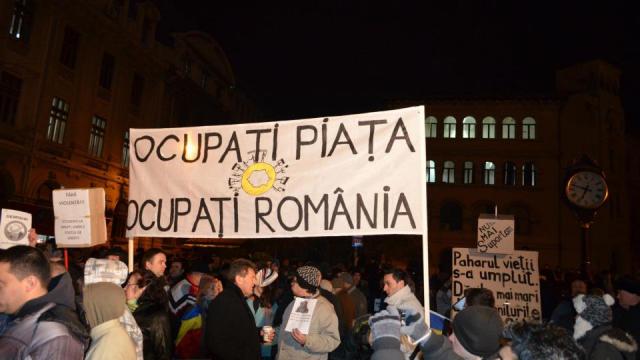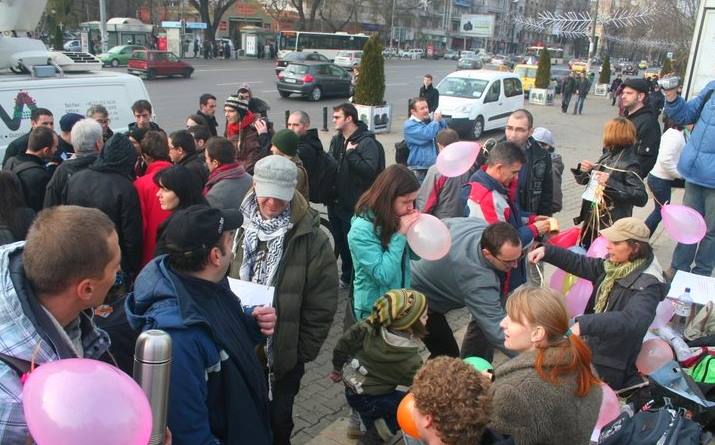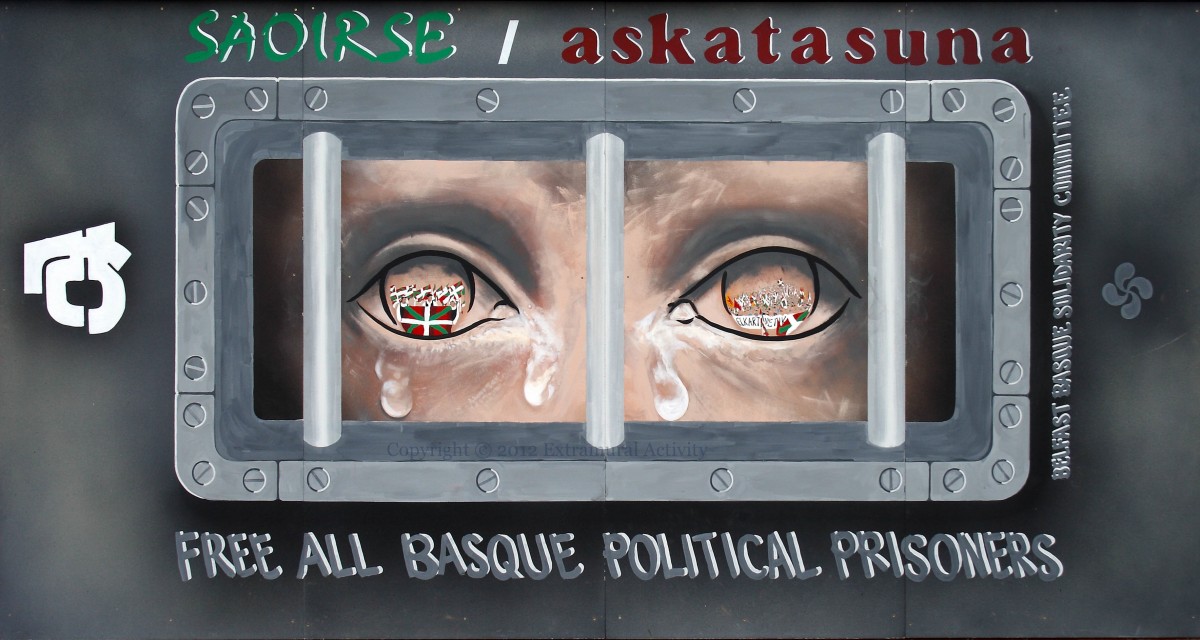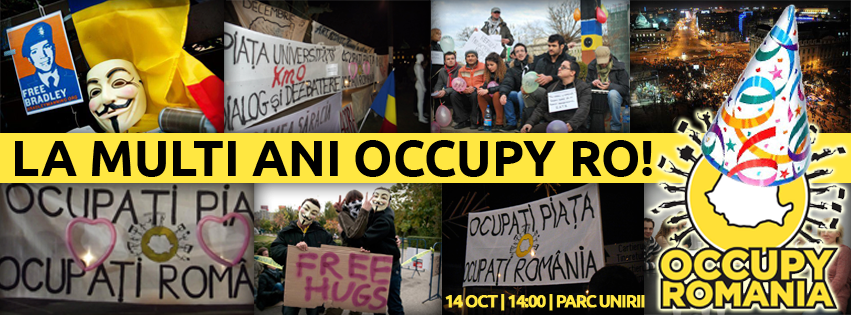
The first major protest this year in Romania took place in Sebes on Jan. 10 against the construction of Kronospan, an Austrian formaldehyde factory. Over 2,000 people vehemently chanted against the cancer-spewing pollutants despite the company’s claim that it employs a technology that's environmentally friendly. The mob erupted: “Corporations make no legislation.”
Legislation is a big issue with Romanians, since they don’t trust laws meant to “protect” them from unfriendly hazards. They don’t really believe in protesting – an act so often hijacked by shrewd, ruthless politicians on the prowl to gain the upper hand over less skilled opponents. And the authorities seem eager to contribute every time the shimmer of unruliness dims their perspective.
The first Occupy sighting in Romania took place Dec. 10, 2011, as a crowd of about 20 people was booked at a nearby police station and fined the equivalent of $300 because they didn’t have proper authorization to protest (even though they had asked for one but never received an answer). They returned to University Plaza, their numbers doubling. This time police booked them at an outskirts police precinct.
"Occupy" has a negative connotation for Romanians – they’ve been mostly occupied during the ages by other countries or empires or strange regimes like communism. In fact, they have been preoccupied with surviving and faking obedience while trying to ignore occupation, or simply relating to it like to a bad weather spell. So it’s still difficult for them to come out of hiding and protest, exposing themselves to unwanted, predictable repression, real or imaginary.
They had tried. The first big strike in Romania's modern era occurred in 1929 with the miners of Lupeni. They did it again in 1977, in the first big anti-communist strike, which was prompted by economic issues – wages and benefits that were drastically cut in the wake of the world energy crisis and that year's devastating earthquake. They occupied the mine front yard and called the nearby mine workers and their families to join, which they did in big numbers: over 4,000 protestors turned out.
The local officials and party bigwigs sent from Bucharest were sequestered on the premises. Rioters vowed they would only talk to General Secretary Nicolae Ceausescu, the country's brutal leader, personally. He obliged and flew over, began by scolding them for being naughty, but soon heard jeers and “Jos Ceausescu!” (Down Ceausescu), and ended by promising help and other amenities. So they let him go away to attend a communist rally in a nearby town.
What followed were harsh reprisals: jail, deportation and physical abuse for the leaders of the uprising. The same scenario repeated itself 10 years later in the city of Brasov, where disgruntled workers first occupied the plant where their wages had been cut in half, and later demonstrated on the way to the town square, joined by onlookers and by Securitate agents who were memorizing faces and taking pictures for later use. They shouted against de “dictator” and “tyrant” while storming the Communist Party headquarters. Militia troops where dispatched at once and the repression commenced that very night, resulting in jail terms, deportations, beatings, demotions and dire deprivations.
Only two years later, the whole country would be seized in most big cities by protesters who brought on the bloodiest, most violent abortion of any of Europe's communist regimes, ending on Christmas Day with the speedy trial and firing squad execution of Communist Romania’s First Couple: Elena and Nicolae Ceausescu. Timisoara was the city where the population erupted first, defending a dissident pastor who faced removal from his congregation and deportation. Soon solidarity grew into a mass uprising as the city's main square was illuminated by countless torches (nationwide public lighting had been almost completely shut down by the frugal party leadership) and occupied by chanting protestors who were rewarded with a barrage of bullets.
But it was just a temporary setback because the next couple of days the whole city would be controlled by its citizens, declaring it the First Communism-Free Romanian Town and demanding, among other things, that in the future no ex-communist party member should be allowed to occupy public office.
Regrettably it was the very issue that was never implemented, contaminating democracy into corruption. As has often happened on this land, the gains from popular unrest were confiscated either by opportunists belonging to a defunct regime, faking true allegiance to the new order, or by genuine revolutionaries seizing fresh opportunities and joining prospering fauna.
The day Timisoara was proclaimed free by citizens branded as “hooligans,” Ceausescu summoned the populace to occupy the big square surrounding party headquarters for a huge communist rally that eventually turned against him, forcing him to climb the roof the next day and flee the capital in a chopper. The chopper soon abandoned him in a field, the pilot fearing it might be downed by a missile since the Army had sided with the winners. The shooting stopped and soon the euphoria fizzled out. Although 84% voted for the new government made up of former somehow liberal communist party members, the students and most of intelligentsia felt deceived, utterly betrayed.
In February 1990 the “hooligans,” this time branded as such by President Ion Iliescu, occupied University Plaza, rebelling against the present regime and its communist DNA. Thousands of miners were called upon to restore order, which they did. In June they would be called again in the face of chanting, singing, reciting poems and hunger striking protesters. Iliescu asked all conscious, responsible forces to wrap around the Romanian Television’s walls, so the liberties hard fought in December wouldn’t wilt prematurely. Next morning, three trains overloaded with merry miners coming from the Lupeni hollows emptied angry brutes onto the streets of Bucharest, attacking protesters, bashing cars, pummeling and roughing up anyone “suspicious,” ie. dressed funny, wearing beards or moustaches, long haired or shortsighted.
This was the precedent: Mineriada, aka Miner’s Crusade. And Iliescu thanked them for saving democracy from death. But in September 1991 the miners rose against the government, threatening to storm Bucharest. When they were refused access to trains, they flocked to them by force and pursued their promise: the miners besieged the government’s headquarters and attacked the Parliament. They requested the prime minster’s resignation, and in the end they got it, plus Iliescu’s handshake. So they took the trains back to where they came from, with newly gained privileges and special benefits.
In January 1999, incensed by the rumors foretelling the closure of several mining centers, the miners’ spirits bubbled up again, led by their charismatic leader, Miron Cozma, who pushed over 14,000 union workers to march towards Bucharest and fulfill their wishes. This time around, President Emil Constantinescu barricaded their entry to Bucharest, but the miners stomped over the police blocks. They were stopped only by the prime minister’s promise to negotiate, which he did, right then and there, at Cozia Monastery, the spot chosen by Cozma for that purpose. Big victory.
Then came defeat. The sixth mineriad was born after Miron Cozma got sentenced to 18 years prison time for the 1991 mineriad disaster. He reckoned only a new assault on the capital would make officials come to their senses, so 2,500 miners embarked on buses to rescue their fellow leader. But they were ambushed by police, defeated severely, and Miron Cozma was arrested and jailed. Another popular movement ended for good, or for worse.
After that came a relative silence. The busiest protesting place in Romania is still University Plaza, subleted once in awhile by students and effervescent souls ever so preoccupied to critique politicians’ slip-ups, acts of discrimination, the President’s abusive spasms, the rape of the environment, and soccer victories. Piata Universitatii, University Plaza, now has a Facebook site as well: Occupy Romania. Facebook was instrumental in electing the new president, Klaus Iohannis, both through voters here and in diaspora. After four escu presidents (Ceausescu, Iliescu, Constantinescu and Basescu), Romania is finally shepherded by a non-escu, and for most Romanians that is an omen. Amen.
Yes, legislation in Romania is not favoring protests of any kind. And it is even harder to act up since the FBI has labeled the Occupy movement akin to terrorism. Now, in the wake of the Charlie Hebdo massacre in Paris, a host of Romanian politicians are lobbying again – after it was already declared unconstitutional by the Constitutional Court – for a so-called “Big Brother” law forcing cell phone companies to ID whoever purchases a prepaid phone card, and retain post-taped conversations for up to six months, readily available to special services. This is sort of superfluous in Romania, where phones are being constantly and customarily taped by the secret police since time immemorial, that is, the communist era.
It is even asserted that we haven’t been so unlucky as the French because the special services have kept a vigil watch, a not so subtle reference to their practice of taping everything indiscriminately. So, there it is: no social phenomenon can preserve its virgin purity and meaning without being taken hostage and perverted for the benefit of the governing crowd, and for our safety. Democracy and freedom could after all be hazardous to your well being – just remember 9/11, the epitome of modern times.
3 WAYS TO SHOW YOUR SUPPORT
- Log in to post comments















